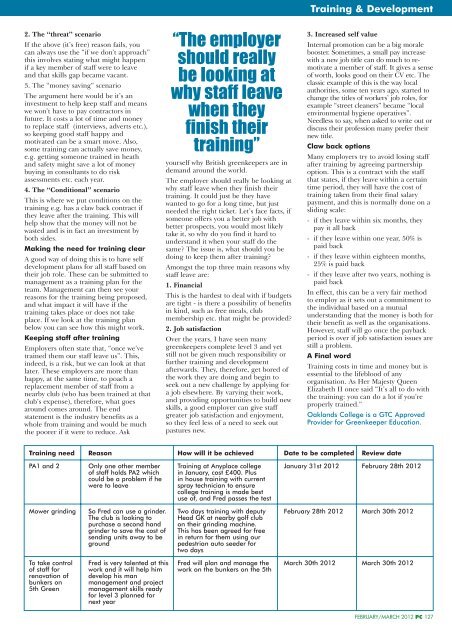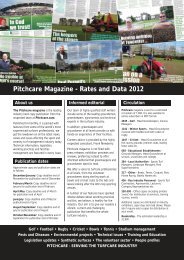these Open Championship Clubs choose to relief grind - Pitchcare
these Open Championship Clubs choose to relief grind - Pitchcare
these Open Championship Clubs choose to relief grind - Pitchcare
You also want an ePaper? Increase the reach of your titles
YUMPU automatically turns print PDFs into web optimized ePapers that Google loves.
2. The “threat” scenario<br />
If the above (it’s free) reason fails, you<br />
can always use the “if we don’t approach”<br />
this involves stating what might happen<br />
if a key member of staff were <strong>to</strong> leave<br />
and that skills gap became vacant.<br />
3. The “money saving” scenario<br />
The argument here would be it’s an<br />
investment <strong>to</strong> help keep staff and means<br />
we won’t have <strong>to</strong> pay contrac<strong>to</strong>rs in<br />
future. It costs a lot of time and money<br />
<strong>to</strong> replace staff (interviews, adverts etc.),<br />
so keeping good staff happy and<br />
motivated can be a smart move. Also,<br />
some training can actually save money,<br />
e.g. getting someone trained in heath<br />
and safety might save a lot of money<br />
buying in consultants <strong>to</strong> do risk<br />
assessments etc. each year.<br />
4. The “Conditional” scenario<br />
This is where we put conditions on the<br />
training e.g. has a claw back contract if<br />
they leave after the training. This will<br />
help show that the money will not be<br />
wasted and is in fact an investment by<br />
both sides.<br />
Making the need for training clear<br />
A good way of doing this is <strong>to</strong> have self<br />
development plans for all staff based on<br />
their job role. These can be submitted <strong>to</strong><br />
management as a training plan for the<br />
team. Management can then see your<br />
reasons for the training being proposed,<br />
and what impact it will have if the<br />
training takes place or does not take<br />
place. If we look at the training plan<br />
below you can see how this might work.<br />
Keeping staff after training<br />
Employers often state that, “once we’ve<br />
trained them our staff leave us”. This,<br />
indeed, is a risk, but we can look at that<br />
later. These employers are more than<br />
happy, at the same time, <strong>to</strong> poach a<br />
replacement member of staff from a<br />
nearby club (who has been trained at that<br />
club’s expense), therefore, what goes<br />
around comes around. The end<br />
statement is the industry benefits as a<br />
whole from training and would be much<br />
the poorer if it were <strong>to</strong> reduce. Ask<br />
“The employer<br />
should really<br />
be looking at<br />
why staff leave<br />
when they<br />
finish their<br />
training”<br />
yourself why British greenkeepers are in<br />
demand around the world.<br />
The employer should really be looking at<br />
why staff leave when they finish their<br />
training. It could just be they have<br />
wanted <strong>to</strong> go for a long time, but just<br />
needed the right ticket. Let’s face facts, if<br />
someone offers you a better job with<br />
better prospects, you would most likely<br />
take it, so why do you find it hard <strong>to</strong><br />
understand it when your staff do the<br />
same? The issue is, what should you be<br />
doing <strong>to</strong> keep them after training?<br />
Amongst the <strong>to</strong>p three main reasons why<br />
staff leave are:<br />
1. Financial<br />
This is the hardest <strong>to</strong> deal with if budgets<br />
are tight - is there a possibility of benefits<br />
in kind, such as free meals, club<br />
membership etc. that might be provided?<br />
2. Job satisfaction<br />
Over the years, I have seen many<br />
greenkeepers complete level 3 and yet<br />
still not be given much responsibility or<br />
further training and development<br />
afterwards. They, therefore, get bored of<br />
the work they are doing and begin <strong>to</strong><br />
seek out a new challenge by applying for<br />
a job elsewhere. By varying their work,<br />
and providing opportunities <strong>to</strong> build new<br />
skills, a good employer can give staff<br />
greater job satisfaction and enjoyment,<br />
so they feel less of a need <strong>to</strong> seek out<br />
pastures new.<br />
Training & Development<br />
3. Increased self value<br />
Internal promotion can be a big morale<br />
booster. Sometimes, a small pay increase<br />
with a new job title can do much <strong>to</strong> remotivate<br />
a member of staff. It gives a sense<br />
of worth, looks good on their CV etc. The<br />
classic example of this is the way local<br />
authorities, some ten years ago, started <strong>to</strong><br />
change the titles of workers’ job roles, for<br />
example “street cleaners” became “local<br />
environmental hygiene operatives”.<br />
Needless <strong>to</strong> say, when asked <strong>to</strong> write out or<br />
discuss their profession many prefer their<br />
new title.<br />
Claw back options<br />
Many employers try <strong>to</strong> avoid losing staff<br />
after training by agreeing partnership<br />
option. This is a contract with the staff<br />
that states, if they leave within a certain<br />
time period, they will have the cost of<br />
training taken from their final salary<br />
payment, and this is normally done on a<br />
sliding scale:<br />
- if they leave within six months, they<br />
pay it all back<br />
- if they leave within one year, 50% is<br />
paid back<br />
- if they leave within eighteen months,<br />
25% is paid back<br />
- if they leave after two years, nothing is<br />
paid back<br />
In effect, this can be a very fair method<br />
<strong>to</strong> employ as it sets out a commitment <strong>to</strong><br />
the individual based on a mutual<br />
understanding that the money is both for<br />
their benefit as well as the organisations.<br />
However, staff will go once the payback<br />
period is over if job satisfaction issues are<br />
still a problem.<br />
A Final word<br />
Training costs in time and money but is<br />
essential <strong>to</strong> the lifeblood of any<br />
organisation. As Her Majesty Queen<br />
Elizabeth II once said “It’s all <strong>to</strong> do with<br />
the training: you can do a lot if you’re<br />
properly trained.”<br />
Oaklands College is a GTC Approved<br />
Provider for Greenkeeper Education.<br />
Training need Reason How will it be achieved Date <strong>to</strong> be completed Review date<br />
PA1 and 2 Only one other member Training at Anyplace college January 31st 2012 February 28th 2012<br />
of staff holds PA2 which in January, cost £400. Plus<br />
could be a problem if he in house training with current<br />
were <strong>to</strong> leave spray technician <strong>to</strong> ensure<br />
college training is made best<br />
use of, and Fred passes the test<br />
Mower <strong>grind</strong>ing So Fred can use a <strong>grind</strong>er. Two days training with deputy February 28th 2012 March 30th 2012<br />
The club is looking <strong>to</strong> Head GK at nearby golf club<br />
purchase a second hand on their <strong>grind</strong>ing machine.<br />
<strong>grind</strong>er <strong>to</strong> save the cost of This has been agreed for free<br />
sending units away <strong>to</strong> be in return for them using our<br />
ground pedestrian au<strong>to</strong> seeder for<br />
two days<br />
To take control Fred is very talented at this Fred will plan and manage the March 30th 2012 March 30th 2012<br />
of staff for work and it will help him work on the bunkers on the 5th<br />
renovation of develop his man<br />
bunkers on management and project<br />
5th Green management skills ready<br />
for level 3 planned for<br />
next year<br />
FEBRUARY/MARCH 2012 PC 127

















